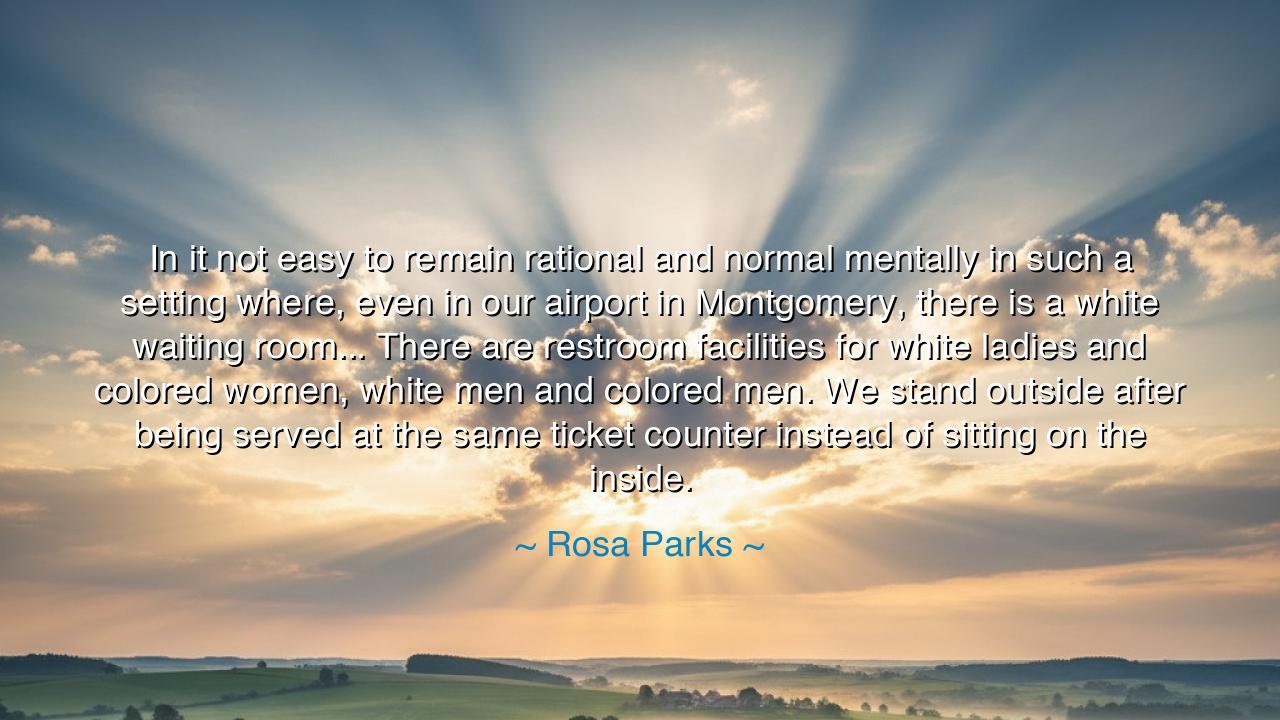
In it not easy to remain rational and normal mentally in such a
In it not easy to remain rational and normal mentally in such a setting where, even in our airport in Montgomery, there is a white waiting room... There are restroom facilities for white ladies and colored women, white men and colored men. We stand outside after being served at the same ticket counter instead of sitting on the inside.






When Rosa Parks declared, “It is not easy to remain rational and normal mentally in such a setting where, even in our airport in Montgomery, there is a white waiting room... There are restroom facilities for white ladies and colored women, white men and colored men. We stand outside after being served at the same ticket counter instead of sitting on the inside,” she gave voice to the crushing weight of segregation. Her words reveal not only the outer injustice of separation but the inner torment of trying to preserve dignity in a world designed to deny it.
The waiting room, the restroom, and the ticket counter—ordinary places—became symbols of humiliation under Jim Crow. These divisions were not simply practical arrangements, but tools of subjugation, daily reminders that African Americans were considered lesser. To endure such treatment and remain “rational and normal mentally” was itself an act of quiet heroism, for the system sought not only to limit bodies but to break spirits.
The ancients knew well that the deepest wounds are not those of flesh, but of the soul. To be told day after day that you are unworthy corrodes the mind like rust on iron. Yet Parks, like the martyrs and prophets of old, refused to let her spirit bend. By naming the indignities plainly, she stripped them of their false power, exposing them for what they were: lies upheld by law.
Her words recall her own act of defiance on the Montgomery bus in 1955. Refusing to surrender her seat, she turned the instruments of segregation against themselves, sparking the Montgomery Bus Boycott and igniting the modern Civil Rights Movement. Just as she had described the pain of the airport, she transformed that pain into action, proving that resistance could spring from the very sites of humiliation.
Thus, let her teaching endure for the generations: when injustice becomes woven into the fabric of daily life, the struggle is not only for rights, but for sanity, dignity, and self-respect. Segregation sought to make African Americans believe the lie of inferiority, yet through courage, they exposed the truth—that no law, no sign, no waiting room can diminish the worth of a human being. Rosa Parks’ words remind us that the fight for justice begins not only with grand gestures, but with the refusal to accept indignity in the smallest of places.






NTHang Nguyen Thu
Rosa Parks’ experience underscores just how deeply racism was woven into the fabric of society, even in seemingly mundane situations like waiting for a ticket or using a restroom. How do we reconcile the fact that many of the structures we take for granted today were built on these lines of separation? What lessons can we learn from this historical context to ensure that such divisions never return, and that equity and dignity are maintained for all?
UGUser Google
This quote makes me reflect on how everyday acts of segregation, like the division of waiting rooms or restrooms, are not just a logistical issue—they are symbols of the power dynamics that defined society. What does it mean to live in a world where even basic human needs were segregated based on race? How did these physical divisions impact people’s sense of humanity and their daily lives in ways we might not fully comprehend today?
JTJack Thidoe
It’s heartbreaking to read about how segregation was so deeply embedded in everyday life, as Rosa Parks describes. The specific mention of standing outside after being served at the same counter is a poignant symbol of how systemic racism stripped people of dignity. How much longer did this kind of public humiliation have to go on before change could be made? And, what kind of courage did it take for people like Parks to confront this injustice?
YLNguyen yen linh
Rosa Parks’ words shed light on the absurdity of racial segregation. The idea of separate waiting rooms, restrooms, and even ticket counters seems so stark and unjust. But beyond the physical barriers, I wonder: how did these experiences affect the mental well-being of those subjected to them? Could the emotional strain of this daily discrimination have contributed to the strength and resolve seen in movements for civil rights?
UGUser Google
Rosa Parks’ quote brings to light the deeply ingrained segregation and its dehumanizing effects. The way she describes the physical separation in places like airports—where people were treated unequally even for basic services—speaks to a much larger societal issue. How did this systemic discrimination affect people’s mental health and sense of identity? Can we truly understand the long-term psychological toll of such treatment on both individuals and communities?